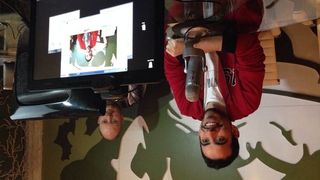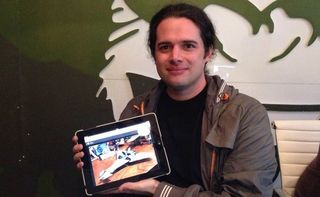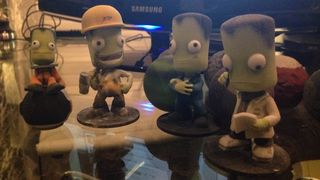Kerbal Space Program dev on random solar systems, the joy of failure and the "cult" of Steam

Kerbal Space Program became quite the phenomenon in 2013. After two years of quiet work, landing on Steam for Early Access brought the game to the attention of millions of gamers and launched Squad, a small interactive marketing firm based in Mexico City, toward the halls of indie success stories. The game is routinely near the top of the list of most popular games on Steam , and a new educational initiative is bringing a version of the space sim to classrooms .
At the first annual Kerbal Kon, PC Gamer spoke with lead developer Felipe Falanghe and PR director Bob Holtzman about the game's meteoric (pun intended) rise on Steam, the challenges of a never-ending developer wishlist, and why failure is fun. Snippets from our interview are below, but you can also check out our full coverage of Kerbal Kon , including the surprise announcement of the game's multiplayer mode.
PC Gamer: Was there a moment where you realized that [Kerbal Space Program] was actually going to work?
Felipe Falange: I think it was a series of small moments that would actually lift the always looming concern of impending failure, up to the point where it built up a sense of accomplishment. But I'm still overly cautious of everything. I'm scared to call the game a success. Bob is always teasing me.
Bob Holtzman: Yeah, I had in the press release, “the popular, award-winning….” and he was like, “is that right?” From the marketing standpoint, the Steam Summer Sale was when everyone was like, “OK, we've got something pretty serious."
Was there a percentage jump?
Holtzman: It was cataclysmic, is what it was.
PC Gamer Newsletter
Sign up to get the best content of the week, and great gaming deals, as picked by the editors.
Falange: If you look at the overall [sales] graph, there's one towering peak in July that marks the Summer sale. There was a small jump in March because people got excited about Steam, and then it started to dwindle to normal levels, and there's this peak.
Holtzman: It crushed.
Falange: It's orders of magnitude. Whenever there's a sale, there's this big jump.
Holtzman: I gotta give a lot of credit to Valve for setting up [the Steam summer sale] such a tent-pole moment for PC gamers. I'm sure we're not the only ones who say this.
Falange: I think Valve is single-handedly keeping PC gaming going; they're a major contributor. If Valve went away suddenly, I don't know what would happen to PC gaming as a whole, but it would affect the entire culture. It's about their culture, their influence that they generate around Steam… They've grown a cult around PC gaming, which is really cool.
Do you have plans to add more solar systems, or even randomly generated solar systems?
Falange: That's something we get a lot, and it's actually something that I'm not very particularly [interested] about implementing. It's not that can't—we could, theoretically. But I think that KSP being a game where you can build your own spacecraft, play the game in your own way, and have essentially a completely different experience from everyone else… the only thing tying these experiences together is that the universe is the same. So if we were to add procedurally generated planets outside the current solar system, you would end up with places and destinations that don't exist for anyone else. And then it would fail in terms of you being able to relate to someone else's experience. You wouldn't be able to say, “Hey guys, I landed on Duna, this was really cool!” And everyone knows what Duna is and what it stands for. Instead, you'd get, “Hey guys, I found this planet, it looks kinda like this.” And people would be like, “Oh... I've got completely different planets on mine.”
Holtzman: The game is science fiction, but one of the things that Felipe has really driven is that he wants the science to come first and the fiction to come second. So when you start talking about multiple solar systems, you get further into the realm of fiction.
Falange: Right, because you're talking about interstellar distances, which means time-warp isn't enough anymore, no matter how fast you're going. Now you need some sort of warp drive, and that falls into the realm of sci-fi. And that then requires us to break the laws of physics, which would in fact make everything much trickier.

Some players are interested in a delta-V indicator [which would show you exactly how much thrust a rocket has, basically]. What do you think?
Falange: I wanted it sometimes, and I un-wanted it other times. In the end, it takes away a gameplay element because it takes some of the guesswork and some of the trial and error and figuring out for yourself what the delta-V is. It might take some of the magic away. One of the great things about KSP is doing just what Chad was doing just now [Editor's note: this was Thursday afternoon, and Chad Jenkins was in the process of livesteaming his creation of a flying rocket-powered surfboard, killing two-dozen Kerbals in the process] . That ridiculous contraption he was doing, just trying to see if he could make it to the water, just shooting it on a rocket. If you make it too technical, it's certainly possible to calculate it. But it's like giving the answer to a puzzle sometimes, and I don't know if we want that. The same applies to showing how much burn time you have remaining. I think there's always this element of tension of trying to calculate in your head how much fuel you have left and if you're going to make it. It's like filling out the crossword puzzle for you.
Has it been difficult to have so many members of the dev team all over the world, and would you prefer it if they lived in one place?
Falange: Given my own commute [Felipe lives up to 90 minutes away with traffic] it's been very natural. I was working remotely before we started hiring people from outside. The whole Skype workflow was already in place. Mexico City is such a large city that a couple of developers who no longer work with us also worked remotely, just because they lived so far away, that it was pretty much the same as being in another city. I actually like it very much that we are able to work remotely this effectively.

Do you have any favorite mods?
Falange: I haven't played with mods in a while, I admit. I have a few of those that I would like to get around to playing with.
Holtzman: Maybe “favorite” is the wrong word. Maybe it should be the ones that intrigue you.
Falange: Yeah, I want to check out the Kerbal Attachment System , which gives you winches and everyone says it's really cool. I never got around to playing it because I can't have a modded install... I'd like to play with mods more than I do now. I've always been really big on modding other games, any game I get I always see if there's a modding community involved, and it always makes it better.
Most Popular








